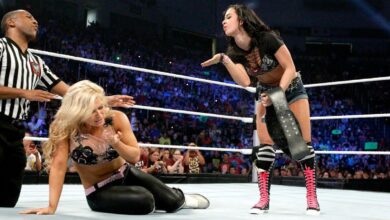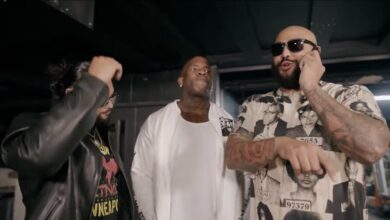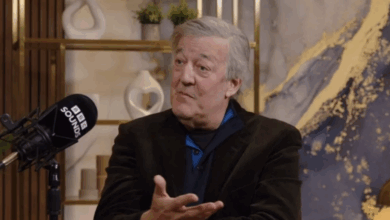
Recently I was watching a Bellator video hyping this weekend’s Phil Davis vs. Liam McGeary fight, and I got distracted by Jimmy Smith because it’s so obvious that Bellator has positioned him as their Joe Rogan and he so blatantly is a Rogan clone in so many aspects, I had trouble taking him seriously regardless of how experienced and knowledgeable he might be. He not only has the same look, with the shaved head and casual T-shirts for the hype videos along with open-collar dress shirts on fight nights, but he does the exact same work for Bellator that Rogan does on UFC broadcasts – ringside commentary, post-fight in-ring interviews and video narration.
Then there’s the Bellator boss – and former Strikeforce promoter – Scott Coker. I very much respect what he’s accomplished, especially against an MMA juggernaut like the UFC. But everything Dana White does, he seems to do, right down to wrapping the championship belt around the champ’s waist while they’re being announced as the winner of their fight, to standing at the podium with the fight backdrop behind him for pre-and post-fight press conferences.
They say that imitation is the sincerest form of flattery, and perhaps there have been a few cases in which this might have been true in the combat sports world. Ric Flair comes to mind, who took the nickname, the bleached blonde hair, the figure four leg lock and the elaborate robes from the original “Nature Boy”, Buddy Rogers. But Flair had such popularity and was such a great wrestler – perhaps the greatest all-around performer in the history of wrestling – that Rogers must have been at least a little flattered that such a great talent emulated him.
The Flair/Rogers comparison though is probably in the minority of flattering if not “acceptable” imitations. After all, Rogers came into prominence in the 60’s when wrestling was very territorial while Flair made it big in the 80’s when television went national and that era’s fans weren’t overly familiar with Rogers. The same can’t be said of Coker and White when they’re current competitors, or Smith and Rogan.
Then there’s Dolph Ziggler, who in recent years has morphed into the second coming of “The Heartbreak Kid” Shawn Michaels to the point that Michaels himself has questioned Ziggler’s mindset. “People compared me to Flair, but as soon as I heard comparisons to Flair I went off the radar and did something of my own, “ Michaels said on Stone Cold Steve Austin’s podcast last December. “The only problem I see with this generation is they continue to go down… like I saw Dolph Ziggler and I said, 'Thank you man. Every Monday night my Twitter numbers go up because I can count on you to remind everyone of me.'”
The problem in Ziggler’s case (just like with Coker and Smith) is that unlike with Flair and Rogers, Shawn Michaels is still relevant to today’s fans, and Michaels was a star on a worldwide stage as opposed to Rogers being mainly known in the northeast territory when he was on top. And then of course whereas Flair was a better all-around talent than Rogers, Michaels is a league above Ziggler, considered by many to be the best in-ring performer of all time.
There have been a ton of cases in which a fighter or pro wrestler borrowed certain elements from someone else, but incorporated those elements into their own unique character as opposed to being a carbon copy imitation. The late great Muhammad Ali long stated that he learned how to talk trash and perform by watching Gorgeous George. Conor McGregor may not readily admit this publicly, but his current persona with the fancy suits, watches, cars, sunglasses and trash talk came from watching Ric Flair. Even Hulk Hogan, arguably the most famous pro wrestler ever, came up with “Hulkamania” from Austin Idol’s “Idolmania”, plus he took the ear-cupping routine from Idol as well. There are hundreds of cases of a talent borrowing certain aspects from other performers to create their own character, but rarely have we seen a blatant imitation, and even more rarely have we seen that imitation surpass the originator’s level of success. The reason is that unless the imitator is SO talented that they’re able to capture the hearts of the fans and be accepted for what they are, they actually do more harm to themselves than good. As Michaels said about Ziggler, and as Smith did for me with Rogan, these people merely remind you of the originator and make it more difficult for people to be entertained rather than easier.
Prior to Ziggler when looking at recent wrestling history, wrestler imitations weren’t even taken seriously, but rather used as comedy routines such as Curtis “Hulk Hogan” Axel or “Macho Man” Damien Sandow. Those characters were meant to blatantly remind people of the original star, and WWE had no intention of getting the current wrestler over or booking him in a prominent position on the card.
So is imitation the sincerest form of flattery? How about you tell me, by posting your thoughts in the comments below.




